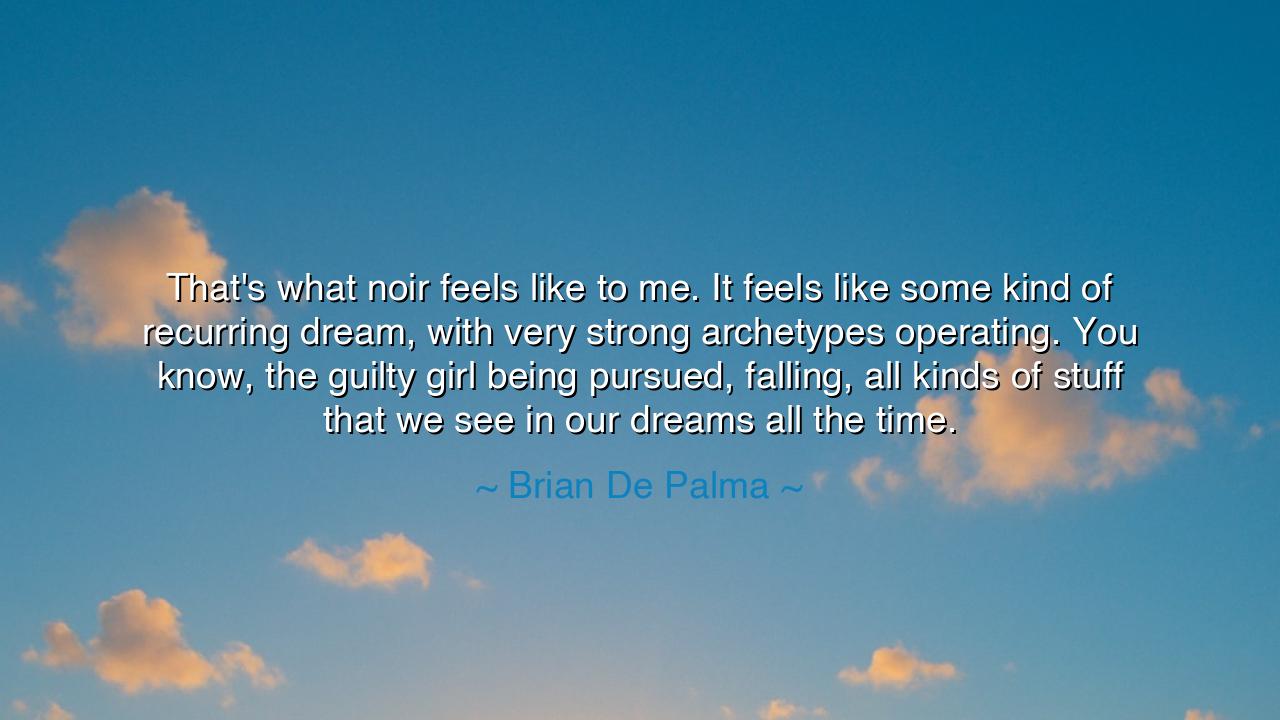
That's what noir feels like to me. It feels like some kind of
That's what noir feels like to me. It feels like some kind of recurring dream, with very strong archetypes operating. You know, the guilty girl being pursued, falling, all kinds of stuff that we see in our dreams all the time.






The words of Brian De Palma, spoken as if from the depths of an ancient oracle, remind us that noir is not merely a style of cinema, nor a passing mood of shadow and smoke—it is the mirror of the human soul when it wanders through its darker corridors. “That’s what noir feels like to me,” he says. “It feels like some kind of recurring dream, with very strong archetypes operating.” And indeed, he speaks truth. For within the dark alleys of the noir world dwell the eternal figures of our own minds—the guilty, the pursued, the fallen, and the dreamer who seeks light but cannot quite escape the night.
In the time of the ancients, the poets and prophets knew that dreams were not idle visions, but messages from the unseen world, whispers from the soul’s hidden chambers. Noir, too, is such a dream—an echo of humanity’s ancient struggle with fate and desire. It is the tale of those who walk the twilight between right and wrong, between love and ruin. The guilty girl being pursued is not only a woman on the run; she is the image of our own conscience, the part of us that flees from truth and longs to be forgiven. And when she falls, she teaches us that no one escapes the gravity of their own heart.
There was once a man named Oedipus, whose story the Greeks preserved for all eternity. Like a character from a noir film, he searched for truth beneath the veil of lies, haunted by crimes he did not yet understand. The shadows followed him wherever he went, and though he sought justice, he found only the reflection of his own guilt. Oedipus, like De Palma’s guilty dreamer, reminds us that fate is not something outside us—it is the shape of our own choices, woven together by the unseen hands of time.
Noir, then, is a modern myth, dressed not in the robes of gods but in the coats of detectives and the lipstick of the doomed. It is humanity’s old story retold in the flicker of black and white light—the ancient war between innocence and corruption, hope and despair. In its smoky rooms and rain-slick streets, we see the battle of the spirit against temptation, the yearning for redemption after the fall. And just as the heroes of old faced monsters and storms, the heroes of noir face loneliness, moral decay, and the hunger of the human heart.
Consider the life of Rita Hayworth, whose fame was dazzling yet filled with sorrow. She became the dream of millions, but her image—the femme fatale—was a mask that consumed her. She once said, “Men go to bed with Gilda, but wake up with me.” Like the recurring dream De Palma describes, her life blurred the line between truth and illusion, between the star and the soul. In her story, we see how easily the dream consumes the dreamer, how the pursuit of glamour becomes a chase through the fog of one’s own making.
So, what lesson do we gather from this? That the world, like noir, is both beautiful and treacherous, filled with symbols that reflect our own hearts. We are all pursued by something—by the memory of what we have done, or the fear of what we may become. Yet in acknowledging the chase, we begin to awaken. Self-awareness is the dawn after the long night. To live wisely is to face the shadows within, not to flee them.
Therefore, dear listener, do not fear the dream. Walk into it. When you feel lost in guilt or confusion, when you sense that old darkness rising within you, remember the lesson of the noir soul: the night is not your enemy—it is your teacher. Face the mirror, confront your archetype, and let the dream speak. For only those who journey through the darkness earn the right to see the first light of morning.
And so, as the ancients would say: let your dreams, no matter how shadowed, lead you home. Let your recurring battles reveal your truth. In every fall lies the seed of awakening; in every pursuit, the chance for redemption. This is the eternal law of life, written not in marble or scripture, but in the trembling heart of every soul that dares to dream.






AAdministratorAdministrator
Welcome, honored guests. Please leave a comment, we will respond soon